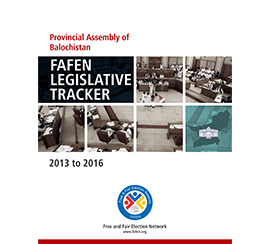- No Private Member’s Bill Introduced in 10th Balochistan Assembly
- Governance Issues Top Priority in Legislation
The committees in the Parliamentary democracies are considered as eyes and ears of the legislature. Their role is important to oversee and monitor the working of various ministries of the government and much of the House business is handled through them. However, in the case of 10th Balochsitan Assembly, the role of Standing Committees has not remained effective, as most of the legislation has been completed without seeking their input.
The 10th Provincial Assembly of Balochistan has passed 60 government bills during 35 sessions held between June 1, 2013 and November 12, 2016, focusing mainly on Governance, Parliamentary Affairs, Economy, Education and Human Rights. A total of 64 government bills were introduced during the reporting period, 60 among them were sailed through without any hurdles in the presence of five-party government alliance in the House. The treasury and opposition lawmakers did not take interest in Private Members’ Bills as no such bill was introduced during the reporting period.
Of 60 legislative proposals endorsed by the Provincial Assembly, only 11 proposals were forwarded to the relevant Standing Committees for deliberations. Four of these bills dealt with Governance issues, followed by Education and Human Rights (2 each) and one each on Health, Economy and Government Employees.
As many as 49 bills were passed without referring them to the relevant Standing Committees, which were related to Governance, Education, Economy, Parliamentary Affairs and Elections.
According to Rule 128, there shall be elected by the Assembly, as soon as may be, the 14 Standing Committees, for the duration of the Assembly, which shall deal with legislation relating to the Department or Departments of the Provincial Government. Rule 136 says that the Assembly may, on a motion made by any Member, remit to the Standing Committee concerned any subject or matter which may be studied by that Standing Committee with a view to suggesting legislation.
The previous (9th) Balochistan Assembly (2008-13), on the other hand, witnessed the passage of 39 bills while the incumbent Provincial Assembly has so far passed 36 (60%) new bills relating to various issues while the remaining 24 passed bills (40%) sought amendments to the existing laws.
The committees took longer time to report on 11 legislative proposals referred to them by the House. On average, each committee took 165 days (23.5 weeks) to pass each government bill. In addition, one of the committees took the longest duration of 532 days to report on the Balochistan Child Protection Bill, 2015 while the shortest period between introduction and passage of the Balochistan Witness Protection Bill, 2015 was 37 days.
To download complete report, click here | To download Urdu Press Release, click here
